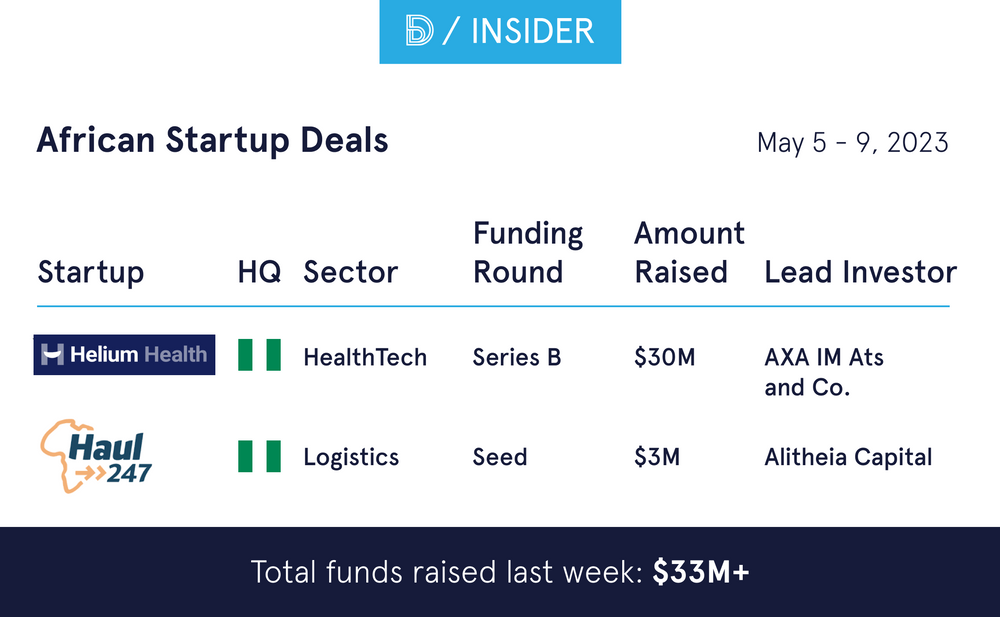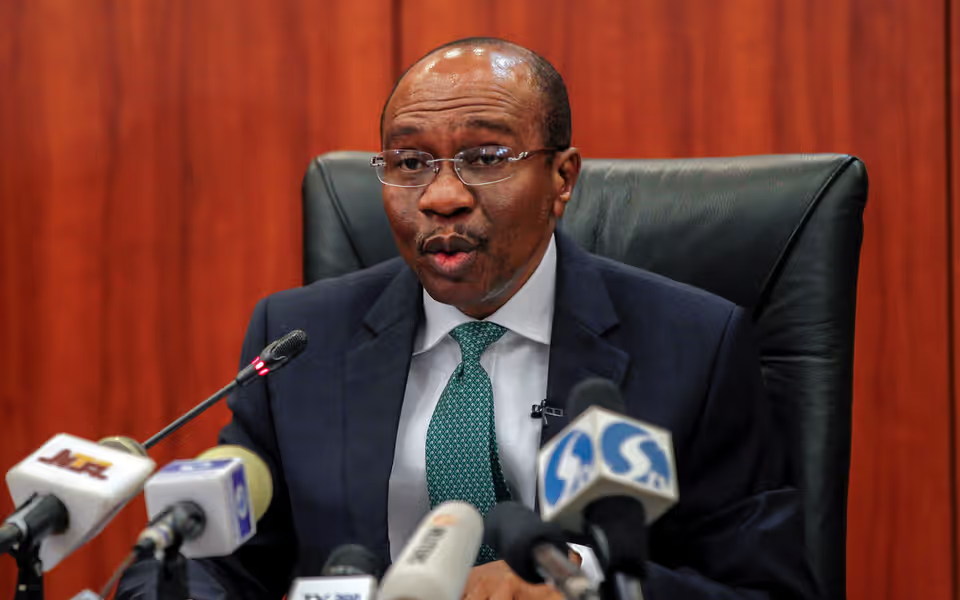In today’s letter, Frank Atat, an experienced banker driving fintech collaborations in Nigeria, shares what fintech founders should look out for when selecting bank partners.
We also cover:
- SEC’s stance on the activities of Binance in Nigeria
- the suspension of the CBN governor
and other noteworthy information like:
- the latest African Tech Startup Deals
- book recommendation, opportunities, interesting reads and more
Insider’s PoV
Frank Atat is the Head of Payments and Solutions at FCMB. Previously, he was the Divisional Head of E-business at Providus Bank, where he oversaw a lot of banking collaborations with fintechs that grew Providus’ total processing volume.
Atat shares his perspective on what fintech founders should look out for when choosing bank partners.
For a founder that is going to the bank for the first time, you also must have a global perspective around what type of business you are running and how risky or not risky it is. So that when they ask you questions you are able to answer those questions and move on with it.
Most banks now have a partnership team. So, know in your mind that you are going to go through a compliance process, a risk assessment process, product review process including infrastructure availability—to know if the product you are bringing carries the weight that you think it carries and if the market will accept it.
The big stories
Binance operations in Nigeria are illegal, says SEC
The news: Last week, the Securities and Exchange Commission (SEC) declared that the activities of Binance in Nigeria are illegal, asking the Nigerian public to seize from using the cryptocurrency exchange or trade at their risk.
“Binance Nigeria Limited is neither registered nor regulated by the Commission and its operations in Nigeria are therefore illegal,” SEC wrote in a statement. The commission also ordered Binance to halt its operations in the country.
“As the regulator with the statutory mandate of investor protection, the Commission urges Nigerians to be wary of investing in crypto-assets, and crypto-asset related financial products and services if the service provider/its platform is not registered or regulated by the Commission,” SEC added.
Why it matters: Despite the ban on cryptocurrencies by the Nigerian authorities, a study recently revealed that Nigeria is the most cryptocurrency-obsessed country in the world, the country is also the largest crypto market in Africa and ranks third behind only the US and Russia on the global stage.
The Nigerian Naira is the first African currency to be used for P2P trading on Binance.
Know more: As of September 2020 (PDF), SEC’s position was that a “crypto asset” is a virtual digital asset which is a form of security, unless proven otherwise. Hence, crypto comes under its regulatory purview. Later in 2022, the commission said that entities that intend to offer crypto-related services or products in Nigeria must secure a Virtual Asset Service Provider (VASP) licence.
Based on SEC’s latest circular, Binance has not acquired this licence. The cryptocurrency exchange is yet to respond to our request for comment.
However, Binance operations are not unknown to the Nigerian government. Last year, the Nigeria Export Processing Zones Authority (NEPZA) said it would partner with Binance to establish the first virtual free zone in West Africa.
Within that period, Binance was looking for a government affairs manager on the continent. Tola Odeyemi, a former policy expert at Uber, the Lagos state government and the Central Bank of Nigeria was hired for the role.
“The Commission shall provide updates on further regulatory actions with respect to the activities of Binance Nigeria Limited, and other similar platforms and shall work with other regulators in Nigeria to provide further guidance on this matter,” says SEC.

Transact globally with a Geegpay USD card
Create a fully functional USD virtual debit card on Geegpay that works everywhere. Easily spend across millions of platforms such as Facebook ads, Ali Express, Twitter ads, Google ads, Apple Music, UKIV, Amazon, GCP, Canva, and much more.
This is partner content. To place an ad, contact: hello@benjamindada.com
What we know about CBN Governor, Godwin Emefiele’s suspension
The scene: On Friday night, Nigeria’s President Bola Tinubu suspended the country’s central bank governor, Godwin Emefiele with immediate effect. “This is a sequel to the ongoing investigation of his office and the planned reforms in the financial sector of the economy,” according to a statement by the office of the Secretary to the Government of the Federation.
Emefiele was directed to hand over to Folashodun Shonubi, the bank’s deputy governor of operations. Following several media reports, the Department of State Services (DSS) confirmed on Saturday that Emefiele was in their custody for investigations.
Why it matters: His tenure at the apex bank has been marred by unconventional policies and his closeness to the Buhari presidency raising questions about the independence of the bank. Emefiele’s administration was also flanked by increased lending and high inflation.
On transparency, the CBN has not published its financials since 2018.
Earlier this year, his uncoordinated Naira redesign threw the country into chaos, leading to loss of life and property. This policy was opposed by several individuals, especially Tinubu’s allies.
In fact, former Kaduna State Governor, Nasir El-Rufai said that the policy was political. Recall that in 2022, Emefiele attempted to run for the Nigerian presidency in total disregard of electoral and central bank regulations.
Following a lawsuit by El-Rufai and other governors, the Supreme Court nullified the Naira redesign policy, declaring it as an affront to the 1999 Constitution.
Know more: Following Emefiele’s suspension, some analysts have asked questions regarding the legality of such a move from the presidency.
“The Governor, the Deputy Governor or Director shall cease to hold office in the Bank if he; [c] he is guilty of a serious misconduct in relation to his duties under this Act; or [f] is removed by the President; provided that the removal of the Governor shall be supported by a two-thirds majority of the Senate praying that he be so removed,” reads Section 11 (2) ( c & f) of the CBN Act.
Similar questions were raised in 2014 when former president Goodluck Jonathan suspended the then-CBN governor Sanusi Lamido.
However, Emefiele has not been removed but suspended.
State of funding in Africa
Last week, Egyptian healthtech Rology acquired Saudi Arabian counterpart Arkan in an undisclosed deal. Founded in 2017, Rology raised a Pre-Series A round last year with participation from Egypt Venture, AAIC and other existing investors.
Find below a breakdown of venture funding that was raised by African startups last week.

Noteworthy
Here are other important stories in the media:
- Moniepoint is planning to leverage M&A for its next growth stage: A few weeks ago, Moniepoint appointed Ross Strike as its new Head of M&A and Investor Relations. What does this mean for the company?
- Flutterwave partners Token.io to provide A2A payments for African e-commerce merchants: African fintech company Flutterwave has partnered with Token.io, a leading account-to-account (A2A) payment infrastructure provider to enhance African e-commerce merchants’ access to European customers.
- Nigerian businessman’s Tingo under scrutiny after short seller’s damning research: Tingo Group, a Nasdaq-listed company that claims a wide range of services in agriculture and finance in Africa is under scrutiny after a short seller alleged irregularities that it said raised doubts about the company’s legitimacy, Semafor Africa reports.
- Can African countries collaborate on an e-car?: Africa’s key auto hubs, South Africa and Morocco, have hinted at mega and giga factories in their electric cars bid to remain relevant and tap a fast-rising global market.
- Less than 10% of African tech startups are led by female CEO, report shows: Fewer than 10 per cent of African tech startups are led by a female CEO, while less than 15 per cent even have a female co-founder, according to a study on gender diversity released by Disrupt Africa.
Opportunities
Jobs
We carefully curate open opportunities in Product & Design, Data & Engineering, and Admin & Growth every week.
Product & Design
- Sabi — Product Design Lead, Nigeria
Data & Engineering
- Interswitch – Senior Software Engineer, Nigeria
- Flutterwave — Frontend Engineer, Nigeria
Admin & Growth
- PZ Cussons — Africa R&D Lead, Nigeria
Other opportunities
- For African founders: Applications open for $120,000 funding from ARM Labs Techstars Accelerator. The program is focused on African fintech, mobility, e-commerce and talenttech early-stage startups.
Book recommendation
Ben Horowitz’s book The Hard Thing About Hard Things is about being a CEO in struggling tech companies, and what he learnt the hard way. Horowitz is the co-founder of Andreessen Horowitz and one of Silicon Valley’s most respected and experienced entrepreneurs.
In this book, he analysed issues with no easy answers through his trials, including demoting (or firing) a loyal friend, whether or not you should incorporate titles and promotions, how to handle them and if it’s ok to hire people from your friend’s company and how to manage your own psychology, while the whole company is relying on you, amongst other subjects.
Have a great week!
Reply to this email and let us know what you think about our letters.
Get passive updates on African tech & startups
View and choose the stories to interact with on our WhatsApp Channel
Explore





